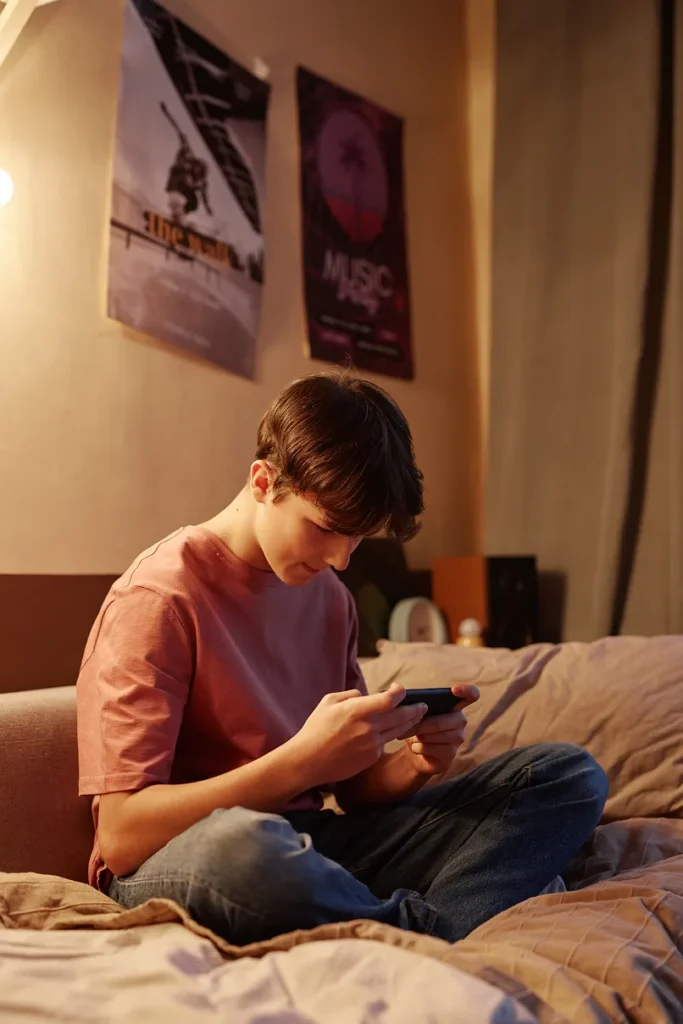Struggling with teen insomnia? You’re not alone—and we’re here to help. At Ascend Behavioral Health, our mission is to provide compassionate, evidence-based mental health care that empowers teens to heal and thrive. Located in Fresno, CA, we specialize in comprehensive teen insomnia treatment that addresses both sleep issues and underlying mental health conditions. Whether your teen is dealing with chronic sleep disturbances, anxiety, or the effects of a disrupted sleep-wake cycle, our expert team offers personalized support to restore healthy sleep patterns and improve overall well-being.
Insomnia is a sleep disorder characterized by persistent difficulty falling asleep, staying asleep, or waking up too early and being unable to return to sleep. From a clinical perspective, insomnia is diagnosed when these disturbances occur at least three times per week and persist for at least three months, despite having adequate opportunity for rest. In teens, insomnia can disrupt emotional regulation, academic performance, and overall health. It may be classified as either primary insomnia—occurring on its own—or secondary insomnia, which is linked to other medical or mental health conditions such as anxiety, depression, or ADHD.
Primary insomnia refers to sleep difficulties that are not directly linked to any underlying medical, mental health, or environmental issue. It often develops from stress, irregular sleep habits, or disruptions to the body’s natural sleep-wake cycle (circadian rhythm). In teens, academic pressures, screen time, and lifestyle habits can contribute to this form of insomnia. Though it’s not tied to another diagnosis, primary insomnia still has a major impact on daily life—and early treatment can help prevent it from becoming chronic.
Secondary insomnia occurs when sleep difficulties are caused by another mental health issue, such as anxiety, depression, ADHD, chronic pain, or even substance use. For teens, emotional stressors or unmanaged mental health conditions are often at the root. In these cases, addressing the underlying problem is key to improving sleep. At Ascend Behavioral Health, we specialize in dual diagnosis care, meaning we treat both the sleep disorder and the co-occurring mental health condition for a more complete and lasting recovery.
Early diagnosis and treatment are essential to prevent long-term effects and restore a teen’s well-being and sleep quality.
Early diagnosis and treatment are essential to prevent long-term effects and restore a teen’s well-being and sleep quality.
Many teens struggle with insomnia due to modern lifestyle habits that interfere with healthy sleep. These habits can overstimulate the brain, disrupt the body’s natural circadian rhythms, and make it harder to fall or stay asleep. Identifying and addressing these behaviors is a key part of effective teen insomnia treatment.
Common lifestyle-related causes of insomnia in teens include:
Making changes to these habits can significantly improve sleep quality and reduce the symptoms of insomnia. At Ascend Behavioral Health, we guide teens in creating healthier routines that support restful sleep and long-term emotional well-being.

Insomnia in teens can present in a variety of ways, and the symptoms often go beyond just feeling tired. Many adolescents experience both nighttime sleep disruptions and daytime effects that impact their mood, focus, and functioning. Recognizing these signs early can help prevent the condition from worsening over time.
Common symptoms of insomnia in teens include:

Persistent symptoms like these can affect nearly every part of a teen’s life. At Ascend Behavioral Health, we offer specialized teen insomnia treatment to help adolescents regain control of their sleep, feel more energized during the day, and restore their mental and emotional health.
Insomnia can be addressed through both clinical treatments and lifestyle-based self-care strategies. While occasional sleep difficulties may be improved through self-help techniques, chronic or severe insomnia—especially in teens—often requires professional support to resolve underlying causes and prevent long-term effects.
Common symptoms of insomnia in teens include:
Common self-guided treatments and lifestyle adjustments include:
While self-treatment can help in mild cases, teens with persistent sleep problems often benefit most from a structured, therapeutic approach. At Ascend Behavioral Health, we combine evidence-based care with personalized support to help teens overcome insomnia and build lifelong habits for healthy sleep.
At Ascend Behavioral Health, we understand that teen insomnia is more than just trouble sleeping—it’s often tied to deeper emotional, behavioral, or mental health challenges. That’s why our approach to treatment is thoughtful, personalized, and built specifically for adolescents. We go beyond quick fixes to provide a structured, evidence-based program that promotes lasting sleep improvement and overall well-being. Below are some of the unique features of our teen insomnia treatment program that make a real difference for both teens and their families.
At Ascend Behavioral Health, we don’t believe in one-size-fits-all care. Each teen receives a personalized treatment plan that addresses their specific sleep challenges, lifestyle habits, and any underlying mental health conditions. Our clinical team collaborates with the teen and their family to create a roadmap that feels supportive, practical, and results-driven.
Many teens experience insomnia alongside conditions like anxiety, depression, or ADHD. Our dual diagnosis approach allows us to treat both the sleep disorder and the co-occurring mental health condition simultaneously. This comprehensive strategy not only improves sleep but also strengthens emotional resilience and day-to-day functioning.
We use Cognitive Behavioral Therapy for Insomnia (CBT-I), which is the gold standard for treating sleep disorders. Our therapists are trained to deliver CBT-I in a way that connects with teens—using relatable language, real-life examples, and practical exercises that build healthier sleep habits over time.
We understand that teens don’t exist in isolation—family dynamics, household routines, and expectations all impact sleep. That’s why we involve parents through education, progress updates, and optional family therapy. Parents gain tools to support their teen’s recovery and help reinforce positive sleep habits at home.
Our treatment environment is designed specifically for adolescents. From our welcoming clinical spaces to our youth-focused programming, we prioritize making teens feel comfortable, respected, and engaged. This atmosphere builds trust and encourages teens to take ownership of their sleep health and mental wellness.

We know that asking for help takes courage. Getting in touch is the first step. We’re here for you, no matter what. Once submitted, our admissions team will be in touch within 24 hours.
Or call us directly to get started: 559-472-3371
Making sure that you or your teen are assessed for optimal care.
We craft a treatment plan tailored to suite individual needs.
Our clinicians make sure there is access to needed medication.
We make sure you or your teen are taken care of after stay.
If your teen is struggling with insomnia, you don’t have to face it alone. At Ascend Behavioral Health, we’re here to support both teens and their families with compassionate, expert care that works. Whether it’s difficulty falling asleep, staying asleep, or dealing with the emotional toll of sleepless nights, our team is ready to help your family find real, lasting solutions.
Reach out today to learn more about our teen insomnia treatment program—or schedule a confidential consultation. A better night’s sleep can start now.


Dr. Tatum received his Doctorate in Clinical Psychology from Rosemead School of Psychology. He has extensive experience developing and expanding behavioral health services, including residential, detoxification, and outpatient programs. As CEO of Sierra Meadows, his focus is on expanding access to care for the Central Valley.
I will be back soon